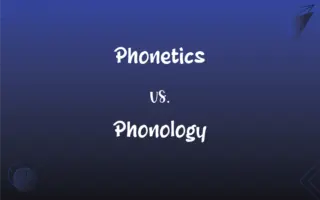Must vs. Have to: What's the Difference?
Edited by Aimie Carlson || By Harlon Moss || Published on November 11, 2023
"Must" implies a strong necessity or obligation often from the speaker's perspective, while "have to" refers to an external obligation or necessity.

Key Differences
"Must" and "have to" both convey the idea of obligation or necessity. However, the source and intensity of this obligation can differ based on the context in which they are used. "Must" often indicates a stronger, more immediate sense of obligation or necessity from the speaker's viewpoint.
In many contexts, "must" can imply an internal feeling or a personal conviction. For instance, when one says, "I must exercise more," it often signifies a personal resolution. On the other hand, "have to" frequently denotes an external requirement or obligation, such as "I have to do my taxes" implying a legal or societal expectation.
Both "must" and "have to" can be used in questions, but their connotations may differ slightly. Asking, "Must I attend the meeting?" might indicate a more personal or introspective query about obligation. In contrast, "Do I have to attend the meeting?" often sounds like seeking clarification on an external rule or expectation.
From a grammatical standpoint, "must" is a modal verb and doesn't change its form regardless of the subject. For example, it's "She must" and "They must." However, "have to" does change form: "She has to" but "They have to."
The negative forms also differ between the two. "Must not" or "mustn't" implies a prohibition or something that is forbidden. On the flip side, "don't have to" denotes the absence of necessity or obligation, suggesting that something is optional.
ADVERTISEMENT
Comparison Chart
Intensity
Stronger, more immediate sense of obligation.
Often denotes an external obligation or requirement.
Source of Obligation
Often internal or from speaker's perspective.
Generally external, like societal or legal expectations.
Usage in Questions
Indicates personal or introspective query about obligation.
Asks for clarification on an external rule or expectation.
Grammatical Form
Doesn't change with subject (She/They must).
Changes with subject (She has to/They have to).
Negative Forms
"Must not" or "mustn't" implies prohibition.
"Don't have to" indicates lack of necessity, making something optional.
ADVERTISEMENT
Must and Have to Definitions
Must
Signifying something is essential or mandatory.
All employees must attend the training.
Have to
Used to highlight a task that needs completion.
I have to finish this project by tomorrow.
Must
A word expressing internal conviction or determination.
I must get back in shape.
Have to
Denoting something is compulsory.
All students have to take the entrance exam.
Must
A modal verb indicating obligation or necessity.
You must complete your homework.
Have to
Expressing inevitability because of a previous action.
If you spill the milk, you have to clean it up.
Must
Denoting a strong recommendation.
You must try their famous cheesecake.
Have to
Expressing an external obligation or requirement.
I have to renew my passport.
Must
Used to express inevitability or predictability.
Given the evidence, he must be guilty.
Have to
Indicating a need based on circumstances.
Due to the storm, we have to stay indoors.
Must
To be obliged or required by morality, law, or custom
Citizens must register in order to vote.
FAQs
Is "must" more internal and "have to" more external?
Generally, yes. "Must" can indicate personal conviction, while "have to" might imply external requirements.
How do "must" and "have to" change with different subjects?
"Must" remains the same, but "have to" can change (e.g., she has to, they have to).
Can both "must" and "have to" be used in past contexts?
"Must" is typically used for the present, but "had to" can be used for past obligations.
Are "must" and "have to" always interchangeable?
No, while they can often convey the same idea, their connotations and usage can differ.
What's the negative form of "must"?
"Must not" or "mustn't."
How does the negative form of "have to" differ from "mustn't"?
"Don't have to" indicates a lack of obligation, while "mustn't" implies prohibition.
Can "must" indicate a recommendation?
Yes, like in "You must try this dish."
What's the main factor determining the use of "must" vs "have to"?
Often, it's the source of the obligation: internal vs. external.
How are "must" and "have to" used in future contexts?
"Will have to" is used for future obligations, while "must" can imply immediate future necessity.
Which one indicates a stronger sense of obligation?
"Must" typically suggests a stronger or more immediate obligation.
How do "must" and "have to" function in questions?
"Must" can be introspective, while "have to" often seeks external clarification.
Are both "must" and "have to" formal in usage?
Both can be used in formal and informal contexts, but "must" can sometimes sound more formal.
Is "have to" affected by auxiliary verbs in negatives or questions?
Yes, like in "Don't you have to go?" or "She doesn't have to come."
Can "must" and "have to" both denote inevitability?
Yes, such as "He must be tired" or "She has to be the winner."
How can one decide between "must" and "have to" in a sentence?
Consider the source and intensity of the obligation, the context, and the desired tone.
Can "must" denote certainty?
Yes, it can, such as "He must be at home by now."
Which one is used more frequently in everyday American English?
"Have to" is often more commonly used in casual American speech.
How do these verbs work in the continuous form?
"Must" doesn't typically have a continuous form, but "having to" can be used, like "I'm having to work late."
Do "must" and "have to" have the same meaning in all contexts?
No, context plays a key role in determining their specific meanings.
Is there a difference between American and British English in their usage?
Yes, in British English, "have got to" can also indicate necessity, similar to "have to."
About Author
Written by
Harlon MossHarlon is a seasoned quality moderator and accomplished content writer for Difference Wiki. An alumnus of the prestigious University of California, he earned his degree in Computer Science. Leveraging his academic background, Harlon brings a meticulous and informed perspective to his work, ensuring content accuracy and excellence.
Edited by
Aimie CarlsonAimie Carlson, holding a master's degree in English literature, is a fervent English language enthusiast. She lends her writing talents to Difference Wiki, a prominent website that specializes in comparisons, offering readers insightful analyses that both captivate and inform.







































































